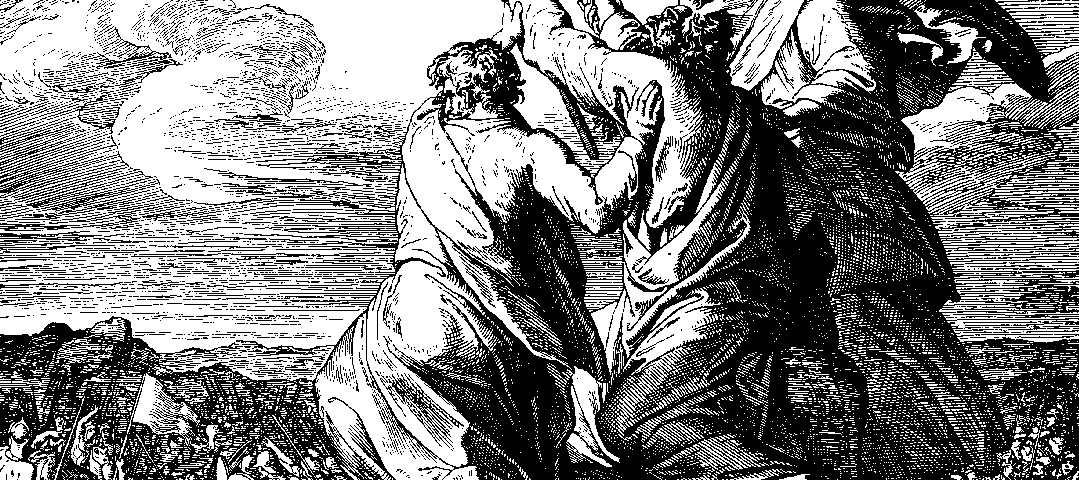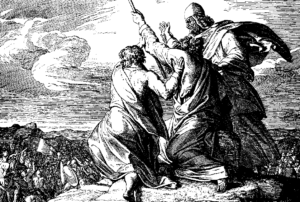Parashat Zakhor – A Mitzva of Identification

There is nothing more personal or more private than a person’s memory. One’s memory, in its totality, is singularly one’s own; it is unique, not replicated in the memory of any other individual. Memory is naught but the aggregate of the experiences of a lifetime. No two individuals share experiences which are precisely identical. Hence no two individuals can have a memory which is entirely similar. Moreover, even when two individuals share the same experience, their memories differ since their respective memories reflect the distinct perceptions and unique perspectives of each person. Nevertheless, to the extent to which different individuals share similar experiences and possess a common memory they are linked to each other in a close bond. The greater the number of commonly shared memories, the greater the bond.
Jews who share common historic memories are bound together in the most cohesive form of identity. To the extent to which, in following the various injunctions of “zakhor,” Jews call to mind and remember a common historical heritage their identity is a shared one. In urging us to “remember” the Torah binds us not only to our past but also to each other in a common consciousness. Jews who remember and do not forget cannot lose their deep sense of peoplehood and identification with the destiny of Klal Yisrael.
An intriguing issue in Jewish law is posed by the question of whether or not women are obligated to attend the special Torah reading of Parashat Zakhor (Deut. 25:17-19). One of several exceptions to the general principle that women are exempt from positive commandments that are time-bound (mitzvot aseh she-ha-zman geraman) is the obligation to listen to the reading of the Megilla on Purim. The Talmud (Megilla 4a) declares this mitzva to be incumbent upon women because, in the words of R. Joshua ben Levi, “They, too, were included in that miracle.” The women who were condemned to death by the decree of Haman were saved; the efforts of women led to the deliverance. Accordingly, women are obligated to participate in all the observances associated with the Purim celebration: listening to the Megilla, exchange of portions, gifts to the poor, and the festive meal.
 However, the reading of Parashat Amalek associated with Shabbat Zakhor raises an entirely different question. The practice is rooted in the scriptural admonitions, “Remember what Amalek did unto you…Do not forget!” from which flow both a positive and a negative obligation. “’Remember,’” declares Sifri, “this refers to words of the mouth. ‘Do not forget,’ this is a reference to emotions of the heart.” Sefer ha-Hinnukh, the classical thirteenth-century work devoted to an explication of ta’amei ha–mitzvot (the reasons and rationales underlying the mitzvot), notes that while these injunctions are applicable year-round, our practice is to read this passage from the Torah once yearly in order to fulfill the commandment to remember by word of mouth. While the reading of Parashat Zakhor might well take place at any time during the course of the year, custom has juxtaposed it to the festival of Purim which too commemorates deliverance from a descendant of the Amalekites. The reading of Parashat Zakhor precedes Purim and causes us to recall that likewise the enmity of Amalek long predated the events which occurred in Shushan. Sefer ha-Hinnukh explains that the purpose of this mitzva is to keep alive in our hearts a memory of the treachery of Amalek so that when the ordained time arrives to fulfill the Biblical mandate requiring the eradication of this people – who are viewed as the epitome of arrogant defiance of God and harbingers of baseless bloodshed – Jews will be motivated to act by strong feelings of anger and disdain. Since, however, women are not obligated to engage in battle or to take part in the obliteration of Amalek, Sefer ha-Hinnukh rules that women are exempt from this mitzva.
However, the reading of Parashat Amalek associated with Shabbat Zakhor raises an entirely different question. The practice is rooted in the scriptural admonitions, “Remember what Amalek did unto you…Do not forget!” from which flow both a positive and a negative obligation. “’Remember,’” declares Sifri, “this refers to words of the mouth. ‘Do not forget,’ this is a reference to emotions of the heart.” Sefer ha-Hinnukh, the classical thirteenth-century work devoted to an explication of ta’amei ha–mitzvot (the reasons and rationales underlying the mitzvot), notes that while these injunctions are applicable year-round, our practice is to read this passage from the Torah once yearly in order to fulfill the commandment to remember by word of mouth. While the reading of Parashat Zakhor might well take place at any time during the course of the year, custom has juxtaposed it to the festival of Purim which too commemorates deliverance from a descendant of the Amalekites. The reading of Parashat Zakhor precedes Purim and causes us to recall that likewise the enmity of Amalek long predated the events which occurred in Shushan. Sefer ha-Hinnukh explains that the purpose of this mitzva is to keep alive in our hearts a memory of the treachery of Amalek so that when the ordained time arrives to fulfill the Biblical mandate requiring the eradication of this people – who are viewed as the epitome of arrogant defiance of God and harbingers of baseless bloodshed – Jews will be motivated to act by strong feelings of anger and disdain. Since, however, women are not obligated to engage in battle or to take part in the obliteration of Amalek, Sefer ha-Hinnukh rules that women are exempt from this mitzva.
The position of Sefer ha-Hinnukh is sharply challenged by the author of Minhat Hinnukh, a wide-ranging analytic treatise which is the basic commentary on Sefer ha-Hinnukh. Minhat Hinnukh finds the exemption of women from this obligation to be problematic on several counts. In the first place, the obligation to remember – “zakhor” – is inextricably connected with the negative commandment “Do not forget.” Ordinarily, women are bound by all negative commandments. Yet Sefer ha-Hinnukh appears to absolve women from both aspects of the obligation. Moreover, technically, the obligation of “zakhor” is not contingent upon time and therefore there appears to be no reason to absolve women from the obligation. As for the reasoning of Sefer ha-Hinnukh that “zakhor” applies only to men “it is for them to do battle and not for women,” Minhat Hinnukh hastens to note that in the case of a milhemet mitzva (a commanded war) all individuals are obligated to participate, “even a bride from beneath the canopy.” Finally, Minhat Hinnukh questions the basic assumption which underlies Sefer ha-Hinnukh’s thesis. Minhat Hinnukh emphasizes that the ultimate rationale for all mitzvot is unknown to us. Reasons advanced by rabbinic scholars, and even by the Talmud itself, do not necessarily exhaust the rationale of a particular mitzva for “who can divine God’s secret ways?” The injunction “zakhor” may well be designed to stimulate vengeance, but, perhaps it is a scriptural edict intended for another purpose as well, a purpose which we cannot fathom. Perhaps even after Amalek will have been utterly destroyed the obligation of “zakhor” will continue to remain in effect. Accordingly, Minhat Hinnukh finds difficulty in accepting Sefer ha-Hinnukh’s view and rules with regard to the reading of Parashat Zakhor, “It appears that all Jewish persons are obligated therein as is the case with all positive commandments which are not contingent upon time.”
A similar ruling obligating women to observe this precept is recorded in a responsum authored by Rav Yaakov Ettlinger, Binyan Zion ha-Hadashot, no. 8. Rav Ettlinger presents two additional points of interest. When confronted by a practical question such as this, one’s instinctive reaction is to determine previous tradition and practice. In knowledgeable Jewish communities the accepted practice was usually based upon reliable halakhic criteria as applied by authorities of earlier generations. It is therefore significant that Rav Yaakov Ettlinger records the response given to him concerning this matter by his own teacher, Rav Avraham Bing. Rav Bing, rabbi and head of a yeshiva in Wurzburg, had studied together with Hatam Sofer at the feet of Rav Nathan Adler, known as he-Hasid she-be-kehunah, the saintly mystic and scholar of Frankfurt. According to Rav Bing, Rav Nathan Adler firmly maintained that women are obliged to listen to the reading of Parashat Zakhor and insisted that even his maid should hearken to its reading. Rav Bing followed his teacher’s practice and so, quite evidently, did his student, Rav Ettlinger.
Rav Ettlinger adds an illuminating insight to the discussion. He expresses his perplexity at the negative ruling of Sefer ha-Hinnukh on the basis of the exclusion of women from warfare. Why, queries Rav Ettlinger, if women are exempt from bearing arms should they not, nevertheless, be included in the obligation of “remembering” the enmity of Amalek? Surely, the feelings and emotions manifested by women can be of great moment as witnessed by the zeal of Esther, Judith and Yael, each of whom brought salvation to the Jewish People. Similarly, concludes Rav Ettlinger, remembrance of the deeds of Amalek on the part of women may arouse their emotions causing them to be instrumental in bringing about the doom of Amalek. To paraphrase Binyan Zion’s argument, if wives, sisters and mothers are unconcerned with the outcome of the struggle, what guarantee is there that the men will be prompted to do battle? They also serve who only stand and wait.
In sum, although Sefer ha-Hinnukh exempts women from this mitzva, there is clearly ample authoritative basis for encouraging women to observe the mitzva of listening to the special reading of Parashat Zakhor. We live in an age marked by attempts to generate new – and often unfounded – customs and ceremonies in order to increase the involvement of women in the Synagogue. Assuredly, women ought to be encouraged to participate in authentic observances, particularly when there is weighty authority which would require them to do so. Women who attend the reading of Parashat Zakhor join in an observance tied to the elemental identification of Jews with the history and destiny of Klal Yisrael.
Judith Bleich is a professor of Jewish studies at Touro College and a longtime member of TRADITION’s editorial board.
